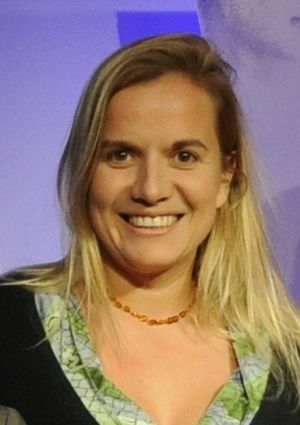Claire Wyart facts for kids
Quick facts for kids
Claire Wyart
|
|
|---|---|

Claire Wyart in 2013
|
|
| Born | 16 February 1977 |
| Citizenship | France |
| Alma mater | École Normale Supérieure University of Strasbourg |
| Awards | Chevalier of the Ordre National du Mérite |
| Scientific career | |
| Fields | Neuroscience, biophysics |
| Institutions | University of California, Berkeley Institut du cerveau et de la moelle épinière (current) |
| Thesis | Dynamique de l'activité spontanée dans des réseaux de neurones hippocampiques d'architecture contrôlée en culture (2003) |
| Doctoral advisor | Didier Chatenay |
Claire Julie Liliane Wyart was born on February 16, 1977. She is a French neuroscientist and biophysicist. She studies how our bodies move, focusing on the special circuits that control movement. Claire Wyart has also received a respected award called the Chevalier of the Ordre national du Mérite.
Contents
Early Life and Family
Claire Wyart grew up in a family of scientists. Her mother, Françoise Brochard-Wyart, is a well-known French physicist and a professor. Her father, Pierre-Gilles de Gennes, was a physicist who won the Nobel Prize. Claire and her siblings were mostly raised by their mother. Claire saw her father as a strong support for their family.
Education and Early Studies
Claire Wyart went to a famous school in Paris called the École normale supérieure. After that, she earned her PhD in biophysics in 2003. She studied at the University of Strasbourg. During her PhD, she worked with Didier Chatenay. She researched small groups of brain cells (neurons) that were set up in a specific way.
Research and Career Highlights
Claire Wyart spent five years doing advanced research at the University of California, Berkeley. This was from 2005 to 2010. She first studied how different smells affect people. Later, she used a method called optogenetics. This method uses light to control the activity of brain cells. She used it to study how zebrafish larvae move.
Starting Her Own Lab
In 2011, Claire Wyart started her own research lab. It is located at the Institut du cerveau et de la moelle épinière (ICM) in Paris. Her lab gets money from international groups like the European Research Council. Her team studies how the central nervous system (the brain and spinal cord) controls movement and posture.
Key Research Areas
Her lab focuses on three main areas:
- How certain brain chemicals affect specific neurons in the spinal cord.
- The connections between the fluid around the brain and spinal cord (called cerebrospinal fluid or CSF) and how the body's spine forms. This includes studying conditions like scoliosis, which is a curve in the spine.
- New ways to treat injuries to the spinal cord.
Claire Wyart's main goal is to understand how to make motor circuits work again in humans. These are the pathways that control movement.
Special Focus on Ciliated Neurons
Her team especially studies "ciliated neurons." These are special brain cells that touch the cerebrospinal fluid. They can sense both touch and chemical signals. These neurons then send signals to the motor circuits in the spinal cord. Along with brain circuits and reflexes, these neurons are a third way our bodies control movement.
Scientists first found these neurons in zebrafish. But Claire Wyart's team has shown that these neurons are also found in other animals, like mice. Her team also found that these neurons can detect if the spinal cord is curved.
Software Development and Collaborations
Claire Wyart worked with her former student, Olivier Mirat. They created a software called ZebraZoom. This program helps scientists study how zebrafish larvae behave.
She also helps guide important scientific groups. She is on the advisory board for Current Biology. She is also on the board of directors for the FENS-Kavli Network of Excellence.
During the COVID-19 pandemic, Claire Wyart worked with Marie-Claude Potier. They developed a test to find the virus using spit samples.
Sharing Science with Everyone
Claire Wyart believes it's important to share science with the public.
Teaching Kids About Science
When she was studying for her PhD, she led a science workshop for children. She did this twice a month at the Exploradôme museum. After her PhD, she spent a year in Nepal and India. She taught science in Tibetan schools using fun experiments. She even won an award for this work!
Now, with her team at the ICM, she uses zebrafish larvae. They teach elementary and middle school children about how living things develop.
Public Information During COVID-19
During the COVID-19 pandemic, Claire Wyart and Virginie Courtier-Orgozozo created a website. It shared advice from experts and tips for staying safe. The website was translated into many languages. Claire Wyart said that scientists have a role to inform society. She believes they should help people make good choices and stay safe.
Awards and Recognitions
Claire Wyart has received many awards for her important work:
- Best Thesis Award from the Université Louis-Pasteur Scientific Council (2004)
- “Défi Jeunes” Award for the science project Terma (2004)
- “Fondation Blancmesnil” Award for the documentary Terma (2005)
- Marie Curie Outgoing International Post-doctorate Fellowship (2007–10)
- Society for Neuroscience Award (2009)
- Bettencourt-Schueller Foundation Award (2010)
- Fyssen Foundation Award (2010)
- Atip-Avenir Junior Team Award (2010)
- Chair of Excellence, École des Neurosciences de Paris (ENP) (2010)
- International Reintegration Grant (2011)
- Prix Émergences de la Mairie de Paris (2011)
- European Research Council Starting Grant (2012)
- Irène Joliot-Curie Young Research Award (2013)
- Human Frontier Science Program Research Grant (coordinator) (2014)
- Chevalier de l'Ordre national du Mérite (2014)
- Laureate, Fondation Schlumberger pour l’Education et la Recherche (2017)
- New York Stem Cell Foundation Robertson Neuroscience Investigator (2016)
- European Molecular Biology Organization (EMBO) Young Investigator Award (2016)
- Federation of European Neuroscience Societies (FENS) Kavli Scholar (2016-2020)
- Human Frontier Science Program Award (2018)
- Member of the European Molecular Biology Organisation (EMBO) (2019)
- Richard Lounsbery Award (2022)
See also
 In Spanish: Claire Wyart para niños
In Spanish: Claire Wyart para niños
 | John T. Biggers |
 | Thomas Blackshear |
 | Mark Bradford |
 | Beverly Buchanan |


